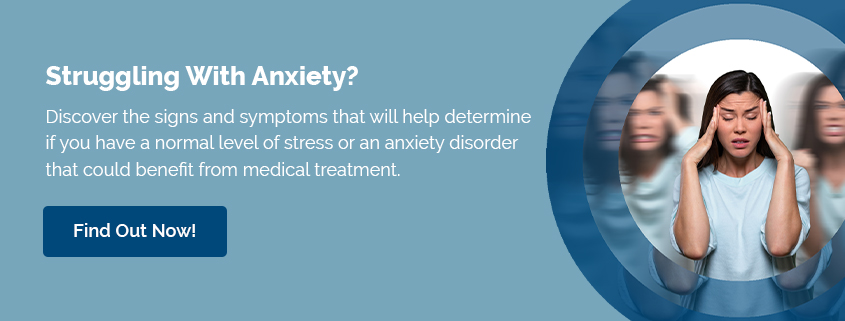Postpartum Depression (PPD): What It Is & How To Get Help
Many women feel overwhelmed with joy and excitement when they find out they are pregnant. They prepare for the eventual changes to their body — and the baby’s arrival. But for some women, pregnancy can bring about unexpected emotions like sadness or anxiety, which can be signs of postpartum depression (PPD).
PPD is a serious mental health condition that affects how mothers feel about themselves and their babies after giving birth, and it should be taken seriously. Studies suggest that one in every seven women experiences PPD within the first year after giving birth — and even one in ten dads suffer (according to Postpartum Support International).
More Than Just The “Baby Blues”
A lot of people casually refer to postpartum depression as the “baby blues,” but PPD is a serious condition affecting a woman’s ability to care for herself and her baby. PPD is a mood disorder causing long-lasting changes in mood. Parents struggling with PPD feel sad or empty, lose interest in things they usually enjoy, have trouble sleeping or sleep too much, have difficulty concentrating or remembering things, and may have physical symptoms like aches and pains.
The National Institute of Mental Health (nimh.nih.gov) explains that postpartum depression is one of two types of perinatal depression. While postpartum depression is marked by an intense depressed mood during the postpartum period, prenatal depression starts during pregnancy. Prenatal depression was added to the Diagnostic and Statistical Manual of Mental Disorders (DSM-5) after a rise in major depression reported during pregnancy.
Postpartum depression is not a weakness and does not indicate whether a person will be a good parent or not; it’s a medical condition that requires treatment and support from loved ones. PPD can develop immediately postpartum or have a slow onset over the course of several months.
Postpartum Psychosis
In rare cases (.2% of deliveries), new mothers can also experience postpartum psychosis. Instead of depressed moods, women with postpartum psychosis experience delusions, hallucinations, rapid mood swings, paranoia, and hyperactivity, among other symptoms. Unlike PPD, the onset of postpartum psychosis is most common within two weeks following childbirth. Postpartum psychosis is serious and has a higher risk of self-harm or harm to the baby. If you or a loved one needs help following the birth of a child, call your doctor or a mental health professional today.
*If this is an emergency, call 9-1-1 or the Suicide Prevention Helpline at 9-8-8.
How to Recognize PPD
The symptoms of depression can vary widely from person to person. Some people experience only a few of these symptoms, while others may be experiencing many at once. Regardless of how many or how severe symptoms are, learn to recognize them so you can get help for yourself or your loved one. According to the American Psychiatric Association, the following are postpartum depression symptoms to watch out for in new mothers:
Symptoms of Postpartum Depression
-
- Feeling sad or empty
- Loss of interest in activities
- Appetite changes
- Feelings of worthlessness
- Frequent crying
- Trouble sleeping or sleeping too much
- Fatigue or lack of energy
- Inability to sit still, pacing
- Difficulty concentrating
- Mood swings
- Irritability
- Feeling like a bad mother
- Fear of harming the baby or themselves
- Lack of interest or avoiding the baby
- Extreme anxiety about being a parent
- Thoughts of self-harm or suicide
If you or a loved one is experiencing these symptoms following childbirth, call a trusted mental health care provider to discuss a depression screening and possible interventions.
*If this is an emergency, call 9-1-1 or the Suicide Prevention Hotline at 9-8-8.
The Risk Factors for Experiencing Postpartum Depression
What causes postpartum depression? Well, a lot of things.
For example, the risk of postpartum depression is higher for women with a history of depression, anxiety, and bipolar disorder. Increased risk of postpartum depression comes from many factors, including genetic makeup, family history of depression, hormone levels from pregnancy and childbirth, and lack of emotional support.
The following circumstances can also create a higher risk of postpartum depression:
- Personal history of depressive disorder (especially during pregnancy)
- Postpartum depression with previous births
- Family history of depression or mood disorders
- Bipolar disorder
- Stressful life events during pregnancy
- The baby has health problems
- Multiple births (twins, triplets, etc.)
- Difficulty breastfeeding
- Problems with a spouse or significant other
- Weak support system
- Financial problems
- Unwanted or unplanned pregnancy
Treatment Options for Postpartum Depression
Postpartum depression should be taken seriously. This mental illness affects each new mother differently, so it’s important to talk to a mental health professional to determine a personalized treatment plan. The following are typically part of a postpartum depression treatment program.
Medication
If a woman is diagnosed with postpartum depression, she may be prescribed medication by a mental health professional, commonly some type of antidepressant. However, antidepressant medications can have side effects (from dry mouth to weight gain) and may be unsafe for breastfeeding mothers. Mental health care providers can decipher whether medication is needed as part of a person’s overall treatment plan. Before starting any medication, review all potential side effects with your care provider.
Medication may reduce symptoms of postpartum depression but should be in conjunction with other treatments, such as talk therapy.
Counseling
Treatment options for any mental condition often include therapy or counseling.
Psychotherapy (or talk therapy) allows the patient to talk through their emotions and struggles with a licensed professional. Family therapy can also help those struggling with postpartum depression. In family therapy, family members come together to talk with a counselor to discuss the struggles they are facing as a family unit after the birth of a new baby.
Support Groups
Support groups can also be extremely helpful in treating postpartum depression. Talking with other new moms who are going through the same thing helps to feel less alone.
Within the past few years, social support has grown for parents struggling with major depression following the arrival of a new baby. With more awareness of the disorder, more new moms can understand why they have these feelings and get help.
Feel Better With Help From Meridian
Postpartum depression is a serious condition affecting new mothers (and sometimes new fathers) with numerous symptoms, including sadness, anxiety, and irritability. If you feel like you may be experiencing some of the symptoms mentioned above in the weeks or months after the arrival of your new baby, Meridian HealthCare has the resources to help. At Meridian, new mothers can also benefit from primary care services, mental health counseling, acupuncture, and chiropractic care.
If you or a loved one is struggling with postpartum depression, there is hope for recovery! Find it at Meridian. Call today to schedule an appointment or make a referral.






